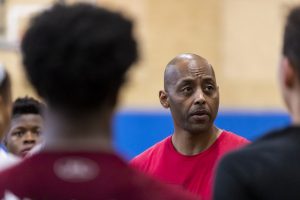This blog was previously published on the iSport360 blog and newsletter – https://isport360.com/when-coach-meets-father-figure-by-michael-skeet-horton/
Having lost my own father at a young age, I understand firsthand the importance of mentoring, coaching and leadership from the adults in my life.
Like other team sports, basketball is a collaborative game that requires players to work together to achieve a specific end goal – in this case, winning the game. It takes commitment, discipline, and communication. Participation in sports is an opportunity for youth to build character and establish relationships. The importance of such traits could not be achieved without the in-depth involvement of the coach.
The role of a coach does not end when the game is over. It sometimes requires a responsibility to take on a father-like presence that positively impacts and shapes the lives of players. To be effective in that role it is imperative that a coach be a great listener and show personal interest in other aspects of the players’ lives. Yes, the common interest in the game, but a coach that embraces the father-figure distinction is prepared to have conversations about topics that do not involve sports. This leadership role embraces the player with the same vigor as a biological parent. There are times when tough love is required and there are times when hugs are necessary. With these relationships there has to be accountability and responsibility; and although the sport is intended to be fun, the responsibility of a coach goes far beyond winning a game. It is the shaping and mentoring of the youth placed in your care.
As I reflect on my role as a father-figure, I am reminded of a former player that is now a parent himself. He affectionately refers to me at “Pops”. The young man grew up without a father in the home. He had a relationship with his biological father, but the relationship was toxic. Even in the midst of tension, his father respected my relationship with his child and was happy I could provide the resources and support his son needed to be successful. While this particular father and son had a broken relationship, there were other players in which the father was actively involved and encouraging of his child. Even as a loving parent, these fathers recognized the additional role I could play in teaching their sons and were supportive of the relationship I shared with his child.
Much like a father, as a coach, I was nurturing but firm. I demanded that they do their best, without making excuses. I checked on their progress at school, and depending on the circumstance, I would discipline or praise. One young man I mentored began trusting me; sharing secrets, requesting advice about his relationships, discussing school, and even talking through minor disputes with his parents. I had the responsibility to coach him on how to communicate with his parents without being disrespectful. I provided guidance that would help him to make positive choices that would impact his future.
Today, that player has a son of his own. He is actively involved and through his own personal commitment, has developed a close and trusting relationship with his child. I would like to think that the examples and lessons I provided him early on have made him a better dad. Prior to being a part of my team, there was no expectation of higher education in his future. He struggled in school because he wasn’t being held accountable or encouraged to work hard in the classroom. We were a travel team yet there were times that I would hold him out of games because of academic shortcomings. The team was not part of the school, yet I knew that to gain his attention, I needed to gently discipline when his actions fell short outside of the court. After years of support and a change in mentality, I am proud to share that he graduated from college in four years with a degree in Business.
On Father’s Day, I am reminded of the impact I have made as a youth basketball coach – the lives I’ve touched. I receive several emails, calls and text messages from former players and parents to express their gratitude for supporting their child on and off the court. Some of the messages applaud me for being a positive example of how to raise a child. Others were from former players that grew up in loving family environments, but still saw the results of my efforts in their lives.
There is one text that sticks in my mind. A former player, now a successful adult, texted to wish me Happy Father’s Day. A moment later he texts again telling me “I forgot you have your own biological child. I was thinking of myself when I said Happy Father’s Day dad.” Yes, I do have my own child, but I consider all of my players to be members of my family.
Michael is the founder of Hoop ‘Til It Hurts! and the Hoop ‘Til It Hurts Foundation. He is a father, coach, teacher, innovator, and mentor who for over 30 years has used sport and community to change lives. Learn more about the foundation at www.HoopTilIthurtsFoundation.org.



